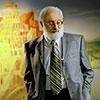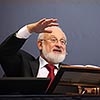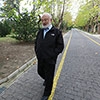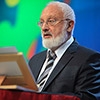

Listen to an Audio Version of the Blog
Download: MP3 Audio
 Question: Couldn’t today’s integral connection between people be considered like the Tower of Babel?
Question: Couldn’t today’s integral connection between people be considered like the Tower of Babel?
Answer: There is no connection between people. There are unifications of markets, banks, etc., and this is the construction of the Tower of Babel (egoism). But it threatens to collapse and bury us under its ruins.
Kabbalah offers the same solution proposed by Abraham 3,500 years ago to the same problem. We must reach unity above our egoism and in spite of it. We will master this method in a good way, meaning by the Light, or in a bad way, through suffering. There is no other way. The predetermined goal of nature is before us, which is to reveal the Creator through unity with everyone.
[154635]
Related Material:
The Whole World Is Ancient Babylon
The Time Of The Babylonian Correction
The New Babel
 Question: What is the upper world that I can feel if I can develop a system of an additional perception of reality?
Question: What is the upper world that I can feel if I can develop a system of an additional perception of reality?
Answer: The spiritual world is called the upper world because it is higher than the material world according to its properties. The properties of the spiritual world are bestowal and love—something that is above our own egoism.
This means that I must exit my egoism in the same sense as a rocket that overcomes the Earth’s gravity when it goes into orbit. Much energy must be spent in order to accomplish this.
When a satellite is in orbit, in free flight, the gravitational force pulls the satellite toward the center of Earth. However, a competing force allowing the satellite to push away from Earth neutralizes it.
This means that we need the kind of force that can push us away from our egoism. Egoism pulls us toward itself, wishing to lock us internally; this is why we are so connected to the material world and cannot separate from it.
Technically, this problem can be resolved by creating such powerful engines that would be capable of lifting us off. In order to escape the gravitational field of Earth, one must reach certain speeds called the first escape velocity (4.97 mi/sec) or the second escape velocity (6.96 mi/sec).
Then, it is possible to orbit the Earth without feeling its attraction. Thus, we neutralize the gravitational force with the opposite force of our desire to get away from it, to rise above it.
The same phenomenon occurs in the wisdom of Kabbalah. If we overcome our egoism that pulls us down toward itself by utilizing the forces of bestowal and love, we rise to such a dimension that is completely built upon bestowal. This means that it is located above our physical bodies, and we enter the new world.
[154439]
From the Radio Program Israeli 103FM 2/1/15
Related Material:
A World Of Two Force
Conception Of The Soul
Real Immortality
 Question: I am a real practical person, one that does not believe in any higher power or in anything else. I just want to know how to gain power over luck.
Question: I am a real practical person, one that does not believe in any higher power or in anything else. I just want to know how to gain power over luck.
Answer: You can rule over luck if you change yourself to be like the power of luck.
Question: What if I am an atheist, can I rule over the good fortune according to your method?
Answer: It is not related to faith. It is a technique by which practical, pragmatic people who want to succeed in life reach a result much quicker.
Question: How can I rule over luck?
Answer: The force that moves you throughout life does not change. You have to become like the force. Just like a child who does not want to go to school has to change his view, his direction.
A child needs to see that if he changes himself to fit the grade he is in, does not want to change the grade according to him, but, if he sits quietly and studies, does his homework, then he can achieve a great goal as a result.
Question: As I understand it, the purpose of this whole school of life is to teach me to love?
Answer: It is true; there is nothing other than that. It is written, “You shall love your neighbor as yourself” is the main rule of the entire Torah.”
What can one gain by doing this? While reaching the properties of love you connect to a higher power and reach the same state in which this power resides in eternity and perfection, without any restrictions.
Question: Who is the supreme power in your example about school? Is it the principal?
Answer: Imagine that there is someone above the school principal, eternal and perfect. And he wishes for you to reach the same condition as him, to become eternal and perfect, at the expense of his internal changes, its internal transformation. When? Here and now! After all, there is no time and everything depends on your effort and perseverance.
Question: What is a higher power?
Answer: A higher power is the comprehensive, sole force of nature, in addition to which there is nothing. And we are all in it. We exist only because this force is the power of love and bestowal, and we should reach the same state in which it resides.
We will reach it, since due to this force, we receive the Torah, the so-called Light that Reforms, a Kabbalah methodology, by which we can easily change ourselves to become like the power of luck.
Anyone who wants to gain power over the good fortune has to come to Kabbalah, and learn how to have good luck all the time.
[154336]
From KabTV’s “A New Life” 1/08/15
Related Material:
The Future World Is Not What You Think It Is
Good Luck Creates Fate
Changing Your Place Brings About A Change Of Luck
 Question: Why do you say that each one sees his own reality in front of him, which he portrays through his own characteristics, if all of us see the same world?
Question: Why do you say that each one sees his own reality in front of him, which he portrays through his own characteristics, if all of us see the same world?
Answer: We all see one world at the moment, but each one of us can change the reality that he senses. The wisdom of Kabbalah is a method for the right perception.
I will see that basically reality is much wider than it seemed to me and that everything in it advances in a good direction. And this will not be an illusion or self-deception. To the degree that I discover the world and bring Light into my life, that is the picture that I see in front of me.
Question: Is reality itself changed or my perception?
Answer: The reality that I see exists only in my perception. From where can I know that it truly exists in a form like this outside of myself? I perceive the world according to my characteristics, but this doesn’t mean that it exists in this form objectively. If the person possessed different characteristics, he would see another world with completely different colors and shapes.
We are so used to a reality that we perceive through our five senses: seeing, hearing, smelling, tasting, and touch that it seems real to us. But things aren’t like that.
A person is like a device with five sensors that are tuned to particular frequency ranges and he is used to living in a world like this. But if we turn the five regulators to other frequency ranges, we will see a completely different reality. Science has reached a discovery like this today, and thousands of years ago the wisdom of Kabbalah spoke about this. So the wisdom of Kabbalah (the Hebrew word for “bondage” means to “receive”) is called this because it is a wisdom for perception of the world.
[154252]
From the Radio Program Israeli 103FM 2/8/15
Related Material:
Are We Awake or Still Asleep?
We All Are Little Artists
The Perception Of Life: A Dream Or Reality?
“It is advantageous when the First Priest possesses dignity and experience. However, both these qualities come with maturity.” (“Let There Be Light”, “Leviticus,” “Emor”)
As a result of multiple levels one goes through on one’s own, one acquires a tremendous experience of spiritual ascents. This experience defines one’s maturity.
“Practically, the Upper Judgment chooses the First Priest regardless of his age under the condition that he possesses all pertinent, required qualities. Particularly, if the son of the First Priest is capable of taking his father’s place, he would be the first choice among other Cohens notwithstanding his young age.”
A “son” stands for the step that immediately precedes the upper level and is the closest to it. This explains why it is superior to all other steps. The upper level is obligated to be a “lifelong Cohen” (i.e. possess a Cohens’ qualities); however, the preference is given to the subsequent, lower step, even though it is not too bright because it constantly stays in the shadow of its upper level.
For example, Rabash was always in his father Baal HaSulam’s “shadow.” Nevertheless, he turned out to be the most worthy among his father’s students. The lower step’s benefits show up gradually; it is impossible to say where they originate from and why. Connection among these qualities is not obvious. Nonetheless, in spirituality, there exists a very rigid liaison between the steps. There, Rabash is not considered to be Baal HaSulam’s son but his disciple.
Comment: Hassidim usually conveyed the leadership from fathers to children.
Answer: Those who were unaware of how to transfer spiritual leadership were sure that they should act in accordance with the Torah: If you are a son of a great man, it means that you have inherited something from your father because he “contributed” his semen to you. However, the notion of “semen” implies the Upper Light, not physiological genes.
As soon as Hassidism began interpreting the Torah literally, it ceased to exist. For some time, Hassidism was based on Kabbalah; later, it transformed into the phenomenon that we observe today—a variation of a national movement.
Overall, Hassidism is a friendly, mild tendency that still has a multitude of external pro-Kabbalistic shades. Even though its traditions, customs, and laws are still based on Kabbalistic principles, the most important part, the work in the heart, is lost.
The founder of Hassidism, Baal Shem Tov, properly transferred this spiritual teaching to his great followers: Dov Ber of Mezeritch and other spiritual leaders. They were great Kabbalists, saints who attained the level of complete bestowal.
In a hundred years, everything started to rapidly change. As a rule, Kabbalists were poor. The rich that surrounded them disparaged them: “Go back to your sheds and read The Zohar, in the meantime, we will build a gorgeous building and everybody will come to us.”
The rich preferred different leaders who were much closer to them mentally and who blessed and respected them. The “golden period” that started with ARI gradually declined and came to an end.
Nevertheless, the followers of Baal Shem Tov instigated an enormous correction processes. Contemporary Kabbalah is based on their work.
[153585]
From KabTV’s “Secrets of the Eternal Book” 5/14/14
Related Material:
The High Priest’s Qualities, Part 3
The High Priest’s Qualities, Part 2
The High Priest’s Qualities, Part 1
 Like A Bundle of Reeds, Why Unity and Mutual Guarantee Are Today’s Call of the Hour, Michael Laitman, Ph.D.
Like A Bundle of Reeds, Why Unity and Mutual Guarantee Are Today’s Call of the Hour, Michael Laitman, Ph.D.
Chapter 3: Corrections Through the Ages
The Evolution of the Correction Method
Moses Says, “Unite!”
The solution came in the form of Moses’ Torah, but also with a new precondition for the execution of any correction from that time onward. To receive the Torah, writes the great commentator, RASHI, the people of Israel stood at the foot of Mount Sinai “as one man with one heart.”[i] That utter and complete oneness later evolved into one of Israel’s most prominent characteristics—mutual guarantee—the noble trait that distinguished Israel from all the nations of the time.
Upon their acceptance of the condition to be as one man with one heart, Israel received the Torah, the instruction, the code of law that would help them tame the ego. With it, they became a society whose every member—man, woman, and child—attained the Creator and lived by the law of mutual guarantee, in equivalence of form with the one God (or force) that Abraham had discovered. The Babylonian Talmud writes, “They checked from Dan to Beer Sheba and no ignoramus [uncorrected person] was found from Gevat to Antipris, and no boy or girl, man or woman was found who was not thoroughly versed in the laws of purity and impurity [corrections according to Moses’ law].”[ii]
With their newly acquired unity, Israel conquered Canaan—from the word Keniaa (surrender)[iii]—and turned it into the “Land of Israel”—a place where the desire for the Creator rules. The Temple that Israel established in the land represented their high level of attainment, where they continued to develop and implement Moses’ method.
And yet, as our sages write, “The evil inclination is born with man, and grows with him his whole life,”[iv] and “The inclination in a man’s heart is evil from his youth, and always grows in all the lusts.”[v] Still, Moses’ method of correction, the laws we call “the Torah,” remained intact through the first and second Temples, and even through the exile in Babel.
But as the spiritual decline of Israel continued, the people found it increasingly hard to hold on to their unity and connection with the Creator. As a result, the Second Temple was at a lower spiritual degree (level of connection, or equivalence of form with the Creator) than the first. Kabbalist Rabbi Behayei Ben Asher Even Halua explains, “Since the day when Divinity was present in Israel, upon the giving of the Torah, it did not move from Israel until the ruin of the First Temple. Since the ruin of the First Temple … it was not permanently present, as during the First Temple.”[vi]
Eventually, the level of egotism increased in the people of Israel to such an extent that it altogether detached them from each other and from the Creator. Indeed, it was the detachment from each other that caused their detachment from the Creator, from the perception of life’s fundamental force. This, in turn, resulted in the ruin of the Second Temple, and the last and longest exile.
In his book, Netzah Yisrael [The Might of Israel], Rabbi Yisrael Segal describes Israel’s fall from grace: “In the Second Temple there was a special virtue, that Israel were not divided in two; there was only unity among them. Therefore, the First Temple was ruined by transgressions that are Tuma’a [impurity], and the Lord does not dwell among them in the midst of their Tuma’a. But the Second Temple was ruined by unfounded hatred, which revokes their unity, which was their virtue in the Second Temple.”[vii]
Similarly, the great scholar and poet, Rabbi Abraham Ben Meir Ibn Ezra, wrote, “‘And you shall step on their high places,’ ‘And I will let you ride on the high places of the earth,’ and the reason is the unfounded hatred that was present in the Second Temple until it generated the exile over Israel.”[viii]
[i] Rabbi Shlomo Ben Yitzhak (RASHI), The RASHI Interpretation on the Torah, “On Exodus, 19:2.”
[ii] Babylonian Talmud, Masechet Sanhedrin, p 94b.
[iii] “It is called ‘The Land of Canaan’ because all who wish to dwell in it must be subjugated by suffering all his days” (Rav Chaim Vital (Rachu), The Book of Knowledge of Good, Bo [Come])
[iv] Midrash Tehilim [Psalms], Psalm no. 34.
[v] Rabbi Chaim Thirer, A Well of Living Waters, Toldot [Generations], Chapter 25 (contd.).
[vi] Rabbi Behayei Ben Asher Even Halua, Rabeinu Behayei about Beresheet [Genesis], 46:27.
[vii] Rabbi Yisrael Segal, Netzah Yisrael [The Might of Israel], Chapter 5.
[viii] Rabbi Abraham Ben Meir Ibn Ezra, Ibn Ezra about the Song of Songs, 7:3.
Writings of Rabash, “Steps of the Ladder”
| [media 1] | [media 2] |
The Book of Zohar, Selected Excerpts
| [media 3] | [media 4] |
Talmud Eser Sefirot, Vol. 6, Part 15, “Histaklut Pnimit,” Item 221
| [media 5] | [media 6] |
Writings of Baal HaSulam, “Introduction to The Book of Zohar,” Item 10
| [media 7] | [media 8] |